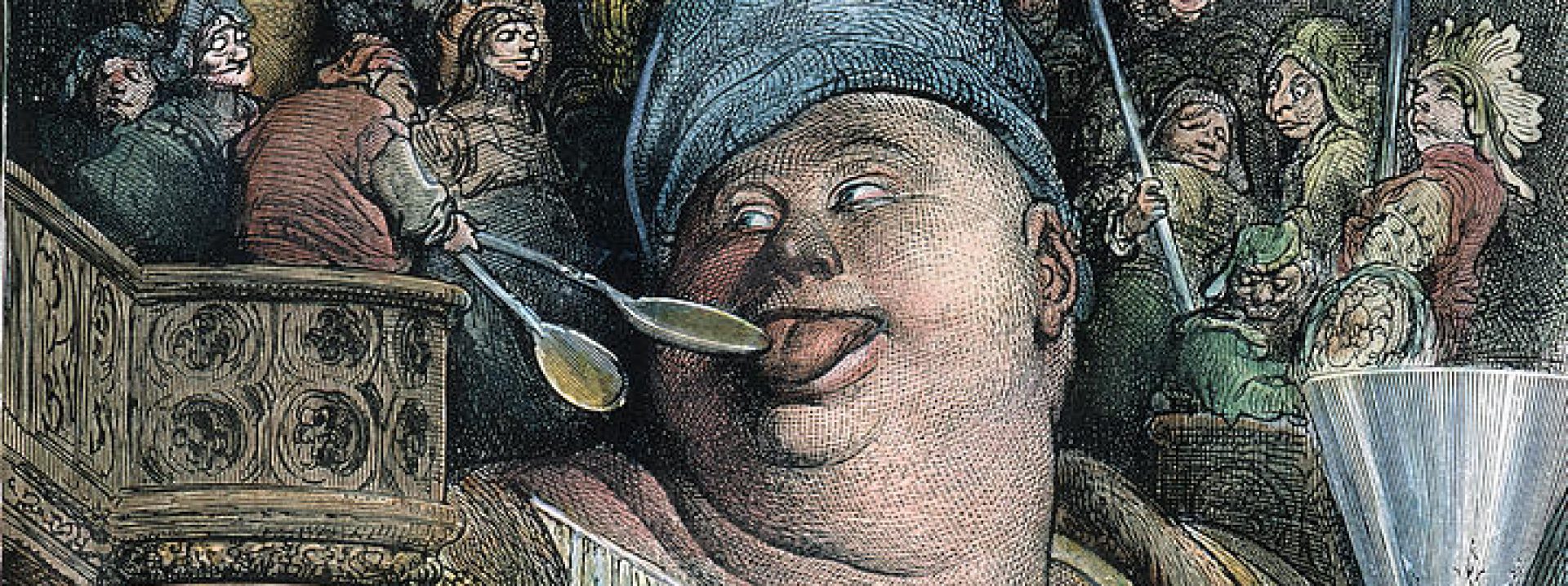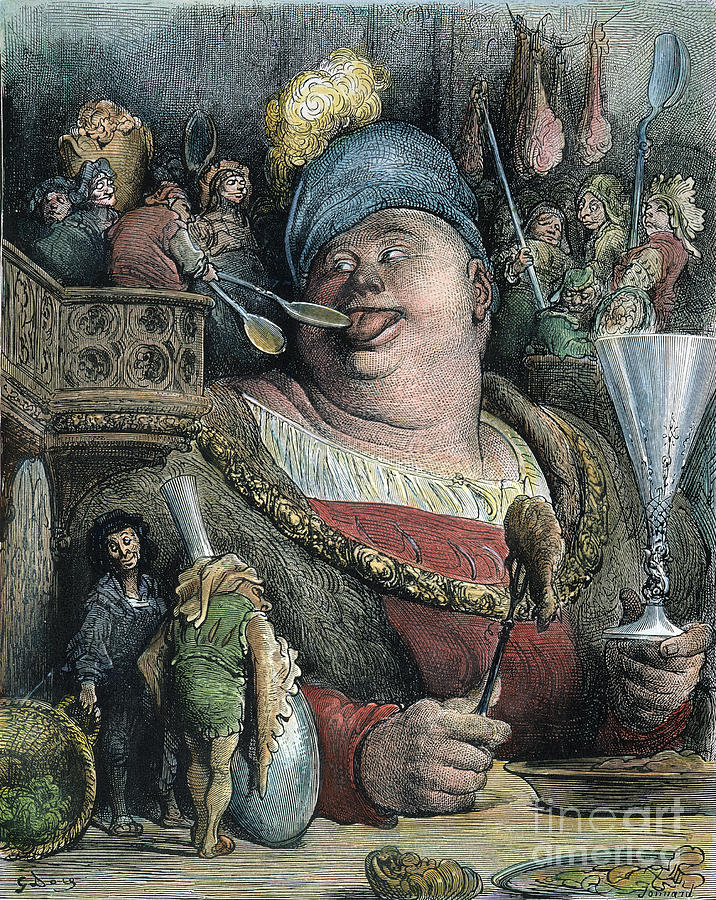My final project is inspired by observations of when billingsgate is applicable in our daily lives. Around friends, who know me quite well, I can (within reason) make jokes at their expense and be joked about in a manner that would be hurtful going to or coming from a stranger. From this observation, the conclusion that billingsgate is not something that can be freely used follows easily. Indeed, in Rabelais and His World, Bakhtin explains that Rabelais’ use of billingsgate is the type of language that rulers attempted to purge centuries later (145). I hope to read the characters of Hal and Falstaff in Shakespeare’s Henry IV through the eyes of Bakhtin to better understand the use of billingsgate, specifically when it is appropriate to use and its consequences. In Bakhtin’s understanding, billingsgate is an expression of freedom, however when used outside of the carnival (i.e. most of life), this freedom often is at the expense of one or more parties.
Bakhtin describes billingsgate as language associated with freedom, citing (albeit critiquing) a passage comparing Rabelais’ language to that of a boy let loose on a spring day (146). In Act I Scene II of Henry IV, Hal and Falstaff exemplify this concept. Immediately upon the start of the scene, Hal makes fun of Falstaff for asking what time it is, as they have no use for knowing the time. Between lines 20 and 33, they briefly describe themselves as being governed by the moon, ebbing and flowing like the ocean. By the subject of their dialogue, they see themselves as free, and their freedom is exaggerated by their status; a knight and a prince are not expected to be thieves by night waking in taverns at noon. Moreover, Bakhtin’s discussion off billingsgate suggests that the content of their dialogue is indicative of their liberated self-perceptions as well. “Quips and quiddities” are threaded throughout their conversation. Upon asking for the time, Falstaff is immediately met with a reply of “Thou art so fat-witted…” from Hal.
The billingsgate between Falstaff and Hal mimics conversations among friends in our lives. Although definitely not as clever or poetic, the light and joking nature of their interaction mirror how I speak with my friends. However, outside of the scarce realms of the carnival, joking insults must be used within proper contexts. For example, I would be afraid to pull out the phrase “thou art so fat-witted” in my job interviews. I would now like to take a closer look at Act II Scene IV of Henry IV to gain insight into the usage of billingsgate in different contexts.
In this scene, Hal and Falstaff engage in a comical mockery of Hal’s impending interaction with his father, King Henry. They do charismatic impressions of both the King and of Hal, however in the last line, Hal sinisterly foreshadows his future rejection of Falstaff and his ways. Falstaff, playing Hal, implores the King, “…banish him not thy Harry’s company. Banish plump Jack, and banish all the world!” In the role of his father, Hal replies only, “I do, I will.” The lack of billingsgate in this line is unsettling, and indeed the line turns out to be prophetic. Implying a lack of carnival, Hal’s reply casts a shadow upon the interaction in rereading, and the reader gains a little bit of insight into how the interaction would read from an outsider. Consider the following line by Hal, playing the role of his father:
“Swearest thou, ungracious boy? henceforth ne’er look on me. Thou art violently carried away from grace: there is a devil haunts thee in the likeness of an old fat man; a tun of man is thy companion. Why dost thou converse with that trunk of humours, that bolting-hutch of beastliness, that swollen parcel of dropsies, that huge bombard of sack, that stuffed cloak-bag of guts, that roasted Manningtree ox with the pudding in his belly, that reverend vice, that grey iniquity, that father ruffian, that vanity in years? Wherein is he good, but to taste sack and drink it? wherein neat and cleanly, but to carve a capon and eat it? wherein cunning, but in craft? wherein crafty, but in villany? wherein villanous, but in all things? wherein worthy, but in nothing.”
While previously this passage read as a mockery of his father and jest at Falstaff, upon removing the immersion in Bakhtin’s carnival, the reader sees hints of a renegade prince realizing his insecurities and subtly acknowledging that his time in his current occupation, with Falstaff as company, must end. This reading more closely aligns with many situations in life; Bakhtin’s carnival is a utopian world, free of insecurity. However, very rarely are interactions in the world, even among close friends, free of insecurity. This scene in Henry IV helps the reader understand how carnivalesque billingsgate begins to be interpreted as the carnival aspects gets even slightly removed. No longer is Hal’s language an expression of freedom, as Bakhtin claims. It now is a expression of acknowledging reality, masked by quips and charm.


Hi Jake,
Thank you for this really cool piece! I really enjoyed reading your work, and your reflections on the contextual determinations of the validity of billingsgate as carnivalesque were really thought-provoking. In particular. In particular, I’m really drawn to this idea of relational setting (like one of friendship versus one of strangers), or emotional proximity, in determining the line between mockery and carnivalesque banter. I really appreciate the way that you’ve taken this into a familiar context for all of us by situating it in an example of modern friendship — it’s super helpful for me to think about it that way!
Hi Jake,
I agree with Allison that this was reflection provoked a lot of thoughts for me. Throughout the class, we’ve been thinking about what a carnivalesque, grotesque utopia would look like, while acknowledging that that utopia can never, would never exist. The carnivalesque can exist for only a few moments during times of festival. I love that your reflection is examining the moment where the carnivalesque collapses back into oppressive reality. I was also drawn to your explanation that billingsgate can only be fun when said in a carnivalesque atmosphere–otherwise the same words and same gestures become cruel or alienating.
Jake, I think your application of billingsgate to everyday life is a really interesting way to think about the Carnivalesque in each of our lives. I never really thought of the (at times) offensive banter that happens several times a day with my friends as billingsgate––and I definitely haven’t thought about the freedom that comes with it. In a room of strangers, I’m sure most people feel like they have to hold back or refrain from making a borderline sketchy comment for the sake of their image. With your friends, there is unspoken freedom that––as you pointed out––separates that friendship from the rest of the world, making it an isolated pocket of the Carnivalesque.